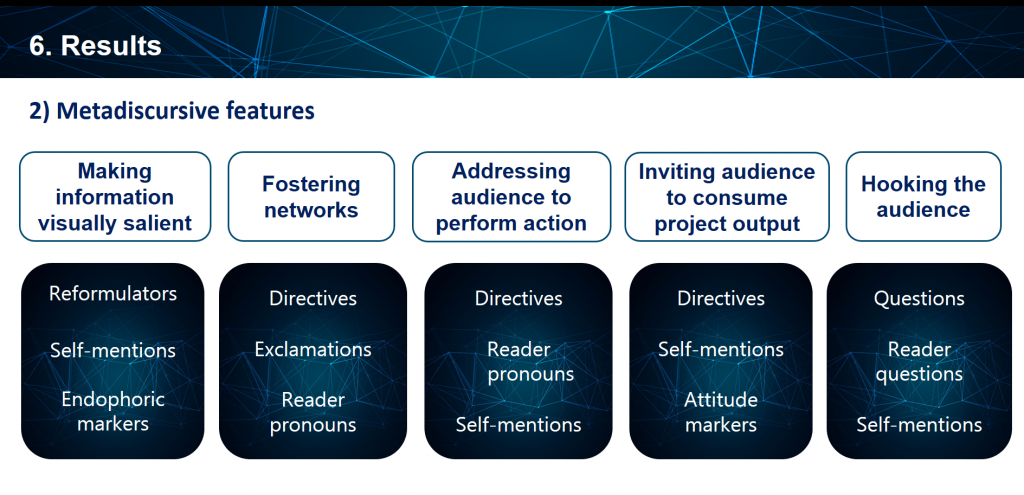MAG 2021: Pascual and Mur-Dueñas’ communication on a pragmatic and metadiscoursal analysis of research projects’ Twitter accounts
Daniel Pascual and Pilar Mur-Dueñas delivered a paper at MAG 2021 (3rd Metadiscourse Across Genres Mapping Interaction in Spoken & Written Discourses) organized online by Universitat Jaume I. The event took place last 27th and 28th May 2021.
In their study they reported the use made of informative, promotional and interactional pragmatic strategies and their characteristic metadiscourse features in a corpus of 10 Twitter accounts from H2020 research projects constituting the EUROPROtweets Corpus. In so doing, they propose some adjustments to be made to analyse digital discourse and situated communicative events. Their analysis shows how interactional features outnumber interactive ones in all three macro-categories of pragmatic strategies. Engagement markers, attitude markers and self-mentions were predominant in informative pragmatic strategies, self-mentions and attitude markers in promotional pragmatic strategies and engagement markers in interactional pragmatic strategies.

Here you can read the abstract of their communication:
Tweeting in EU research projects: Pragmatic functions and metadiscoursal realizations
Researchers are expected to ensure the global dissemination and visibility of their knowledge production and findings, and thus build scientific and societal development, leveraging the affordances of digital platforms (Lorés 2020). Among them, Twitter is becoming an effective, instrumental and professional social network, especially for research groups to broaden their outreach, disseminating their outputs among different stakeholders, and to widely report and enhance the progress of their projects. Twitter is increasingly used by research groups to introduce themselves as members of the same community and share their everyday work (Kuteeva 2016). Discursively, they do so through an array of pragmatic functions with clearly overarching communicative intentions, namely, informative, interactional and promotional. It is then our aim (i) to identify and analyse the range of specific pragmatic strategies within each of these macro-functions, and (ii) to look into their realizations identifying salient metadiscourse features in each of them. To do so, a corpus of 1,454 tweets –34,746 running words– extracted from 10 EU funded research project Twitter accounts will be explored using the NVivo data analysis software. A preliminary study has revealed that a wide range of pragmatic micro-strategies are used as instantiations of each macro-function. In particular, 30 strategies have been identified which research project groups employ strategically to foster their identity and make themselves visible. It is hypothesised that pragmatic informative micro-strategies in the corpus will be characterised by a scarce use of metadiscourse devices, that pragmatic interactional micro-strategies will display a high number of engagement features, and that promotional ones will be frequently realised through self-mentions, attitude markers, and intensifiers. The analysis will help us gain insights into researchers’ digital discursive practices, and how their use of such strategies and their metadiscourse choices has an effect on the way they project themselves as a group and disseminate their investigations.
Keywords
digital discursive practices; research projects; Twitter; pragmatic strategies; metadiscourse resources
References
Kuteeva, M. 2016. Research blogs, wikis, and tweets. In Hyland, K. and Shaw, P. (eds.), The Routledge Handbook of English for Academic Purposes. Routledge: London, 433-445.
Lorés, R. 2020. Science on the web: The exploration of research websites of energy-related projects as digital genres for the promotion of values. Discourse, Context & Media 35, 1-10.
